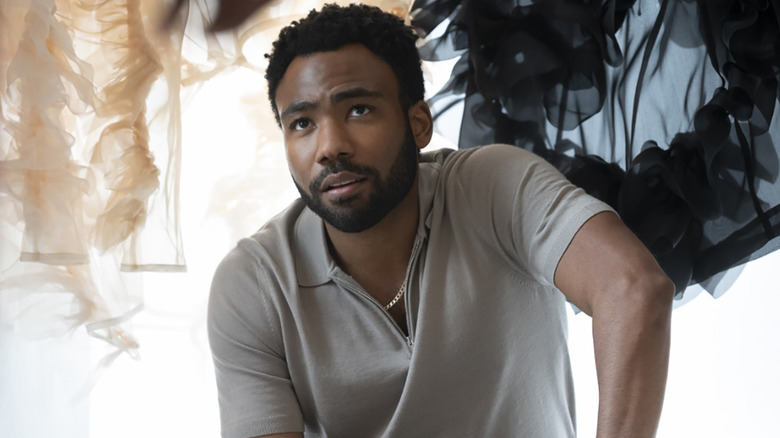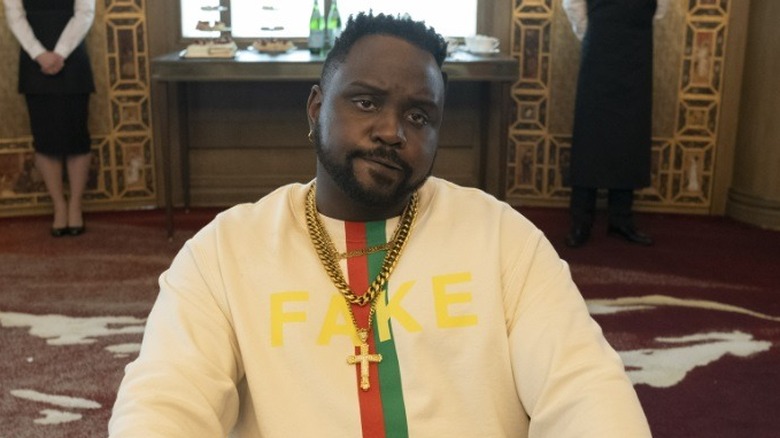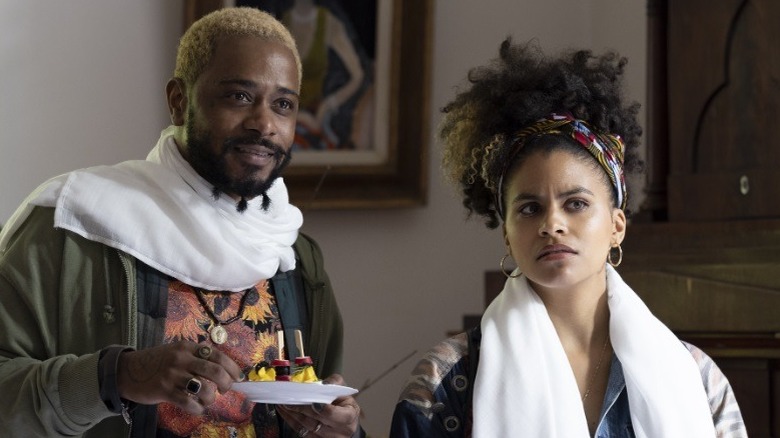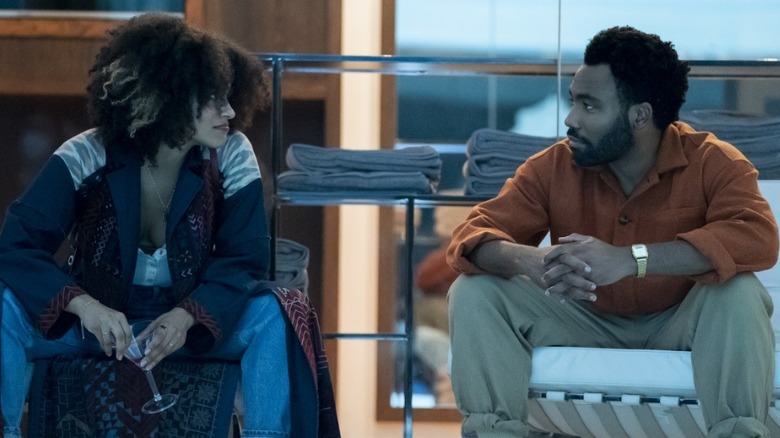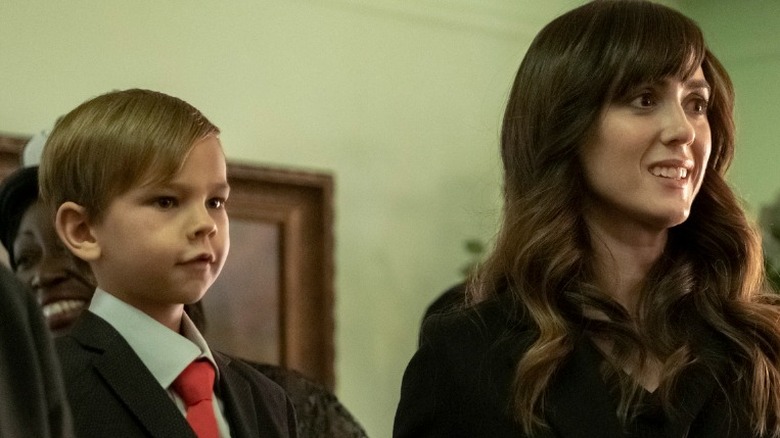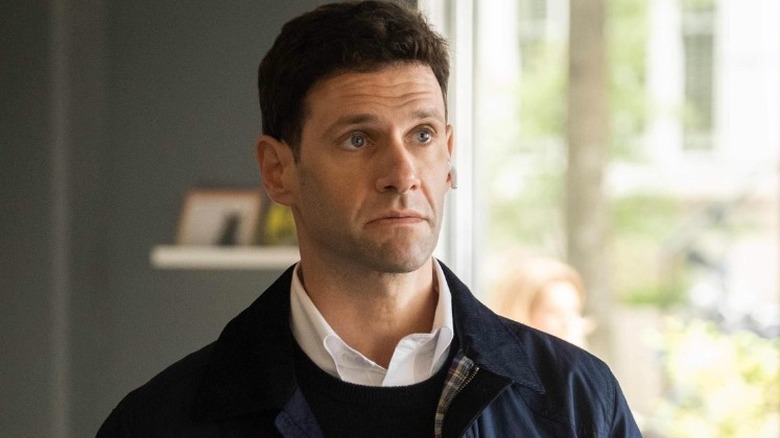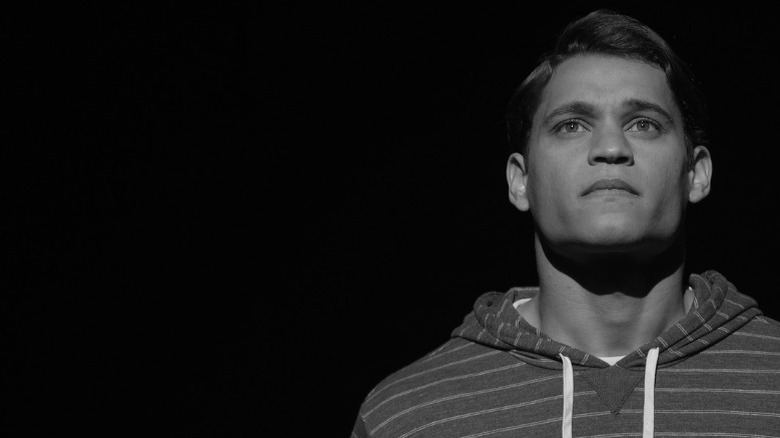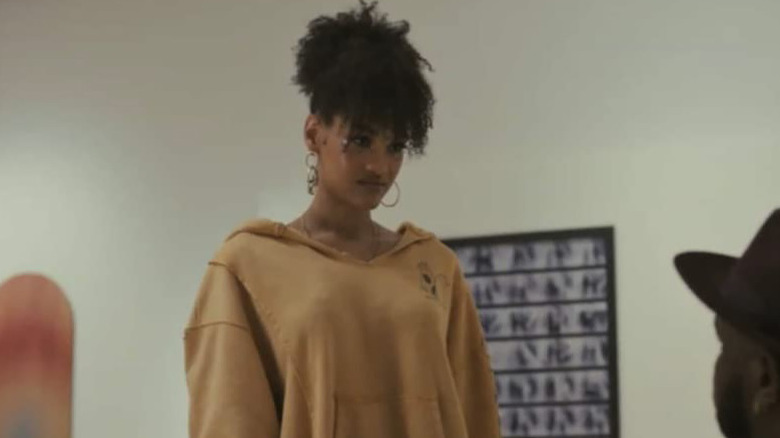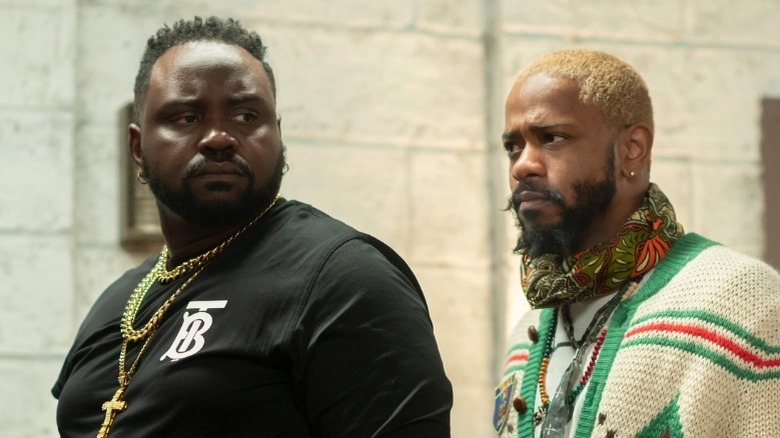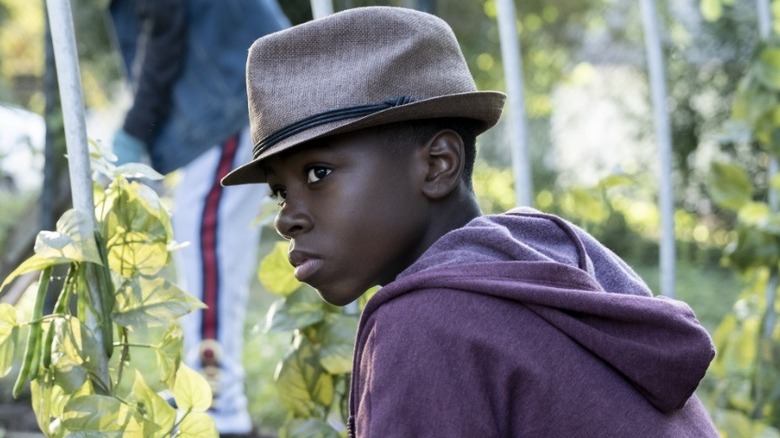Every Atlanta Season 3 Episode Ranked Worst To Best
After four long years, actor-writer-rapper Donald Glover's Emmy and Golden Globe-winning dark comedy "Atlanta" has aired its third season. Created, executive produced by, and starring Glover, the series uses the Atlanta rap scene to explore a wide variety of issues like race, racism, identity, class, capitalism, and, of course, the fascinating insider world of music, art, and rap. "Atlanta" draws on Glover's experiences growing up in Georgia before breaking out as a rapper and comedian. Glover's intimate knowledge of the industry combined with the series' frequent tonal shifts and pointed perspective on the Black experience have made "Atlanta" one of television's most unexpected and exciting shows to watch.
A lot has happened since "Atlanta" was last on-air, giving Glover and his writing staff plenty of rich material to explore. The third season is the series' most bold and experimental, removing Glover's Earn and the cast from Atlanta and placing them abroad, away from the immediate political concerns at home and instead using standalone episodes to explore ideas and themes relevant to the show's concerns. All of these choices made for a captivating and engrossing season. Here, we've ranked every "Atlanta" Season 3 episode from worst to best.
10. White Fashion
One of the themes of "Atlanta" Season 3 is Al's (Brian Tyree Henry) rise to fame and its many fascinating dynamics from numerous angles, including rap's relationship to the fashion industry. "White Fashion" follows a problematic high fashion company that brings Al into the fold for positive press after receiving negative backlash for a racist ad campaign. Al agrees to the partnership hoping for free clothing, but also wanting to find a way to give back. Meanwhile, when one of the company's assistants agrees to take Darius (LaKeith Stanfield) for jollof rice, he finds a bit of home while abroad.
However, Al and Darius are both in for a rude awakening when their cultural interests clash with those of the white capitalist machine they're trapped in. "Atlanta" does many things well; one of which is to explore the multiple facets of artistry and fame, and how celebrity is different for rappers and Black artists. "White Fashion" is a complex and frustrating exploration of the inner workings of an elite culture few will ever glimpse or understand, told only as "Atlanta" can.
9. Sinterklaas Is Coming to Town
The third season of "Atlanta" follows Al and the crew on the splashy international Paper Boi tour through Europe with Amsterdam as a focal point. While Al and Earn prepare for a Christmas show, they're confronted by Holland's unique racist holiday tradition of Zwarte Piet, or Black Pete, throughout the city. "Atlanta" uses Black Pete as a comedic and thematic backdrop for the episode to illustrate the ways in which Black Americans face racism abroad. Meanwhile, as Al and Earn deal with the chaos of last-minute show prep, Darius picks up Van (Zazie Beetz) from the airport who makes a surprise appearance.
With Earn busy, Darius offers to chauffeur Van around the city and the two make for a refreshing pairing, especially as Van clearly is in need of some soul searching. Van's sense of aimlessness leads her and Darius to crash an end-of-life party which, in typical "Atlanta" fashion, creates the episode's most thoughtful and shocking moments as Van bonds with the death doula in a beautiful moment of acting from Beetz. The episode's final sequence, however, is one that speaks to the true ethos of "Atlanta," underpinning the intersections of what success looks like for Al.
8. The Old Man and the Tree
One of the main appeals of "Atlanta" is its ever-expanding style and fearless storytelling. The show also has one of television's most dynamic and talented casts, making the episodes where all four main characters stick together some of the most exciting. "The Old Man and the Tree" follows the Paper Boi crew attending the party of a British billionaire paying for Al's company and Earn's business sense. In typical "Atlanta" fashion, the party allows the episode to explore lots of rich themes with plenty of humor as Earn and Al have differing complicated interactions with the wealthy, while Darius deals with a gang of woke white people trying to defend his honor.
Similar to Season 1's "Juneteenth" or Season 2's "Champagne Papi" episodes, "The Old Man and the Tree" puts familiar characters in an unfamiliar party environment, allowing for a sense of comedic relief while smartly navigating issues of class and race — a balance unique to the skilled writing of "Atlanta."
7. Trini 2 De Bone
One of four standalone episodes, "Trini 2 De Bone" is a heartbreaking and maddening look at a white family dealing with the immediate aftermath of the death of their Trinidadian nanny. The mother, Bronwyn (Christina Bennett Lind), seems largely detached from her family as a whole, parenting through strategic decisions rather than intimate moments. The father, Miles (Justin Hagan), is more empathetic about his child's connection to their nanny, determined to help their son grieve.
Though Bronwyn wants to move on to a more "metropolitan" nanny and leave the past behind, Miles insists they give their son, Sebastian (Indy Sullivan Groudis), an opportunity for closure and attend the funeral as a family. The result is a cultural clash with Sebastian showing a cultural competency and comfort around the late nanny's family that his parents lack, with Bronwyn in particular feeling deeply uncomfortable. The episode is set entirely in New York, yet connected thematically to the rest of the season as it raises questions about the impact of multiracial nannies on the children they raise and their own children they are sometimes forced to neglect.
6. The Big Payback
One of the more genre-bending standalone episodes of the season imagines what the rollout of reparations might look like according to the sensibility and worldview of "Atlanta." The episode opens after a fictional class action lawsuit at Tesla gives legal precedent that allows Black people to sue other individuals for reparations based on a legacy or history of slave ownership in their families. "The Big Payback" primarily follows this social experiment through the lens of Marshall Johnson (Justin Bartha), a recently separated single dad who is focused on trying to put his family back together.
When Sheniqua (Melissa Youngblood) sues him for $3 million, the figure she determines her family is owed for generations of backpay, Marshall becomes the worst kind of stereotypical privileged white man, refusing to be accountable and instead playing the victim, blaming Sheniqua and reparations for his downward spiral. "The Big Payback" brilliantly explores the issue of reparations in a way that feels grounded and surreal at the same time, anchored by the series' offbeat humor and tonal shifts to make for a provocative and satisfying episode.
5. Rich Wigga Poor Wigga
The season's final standalone episode is similar to the others in that it takes a real-world political topic and analyzes it through the uniquely surreal world of "Atlanta," yet it will likely be remembered as one of the most stylish of the series. Season 3's penultimate episode grapples with a lot of complex issues — colorism, internalized racism, and identity — as Aaron (Tyriq Withers), a white-passing Black high school senior struggles to afford to go to the same college as his girlfriend.
When a wealthy philanthropist who graduated from his high school decides to pay for the tuition of all graduating Black students, Aaron has to prove his Blackness to himself and others in order to earn the scholarship. After a lifetime of conforming to the safety and comfort of white culture, the tests he and other Black students face raises complex questions about what it means to be Black, especially from the perspective of Glover. "Rich Wigga Poor Wigga" is shot in beautiful black and white photography in the style of classic Hollywood social problem films, lending it an air of tension, mystery, and emotion.
4. New Jazz
While Earn is ostensibly the main character of the series, "Atlanta" has never been afraid to let other characters share the spotlight. "New Jazz" follows Al as he embarks on a journey to get high in Amsterdam with Darius, but the trip soon takes a turn for the worse. After escaping some unhinged fans, Al meets Lorraine (Ava Grey), a beautiful and mysterious woman who keeps it ruthlessly real with him, including making fun of his hat. Lorraine also takes him to the Cancel Club, the closest the series has come to directly commenting on the broad and unwieldy idea of cancel culture with a shocking, winking, and debatably effective celebrity cameo that could only exist in the world of "Atlanta."
Brian Tyree Henry allows Al's subconscious fears and vulnerability to surface, giving subtle new dimensions to an endearing character with incredible skill. Additionally, "New Jazz" avoids the trappings of typical stoner episodes, lacking goofy adventures or trippy visual sequences. Instead, it leans into the surreal psychological horror of a bad trip that feels real, and the emotions and fears that can rise to the surface.
3. Tarrare
While Van has largely been given short shrift as a character throughout "Atlanta" with not enough space to fully explore her story, "Tarrare" gives her a moment to shine by spotlighting the mystery of Van's Season 3 arc. After her sudden arrival in Amsterdam at the beginning of the season, the typically reliable and grounded Van disappeared from Earn's life just as abruptly. "Tarrare" fills in the gaps after Van's friend Candice (Adriyan Rae), who first appeared in Season 2's "Champagne Papi," spots her on the street in Paris.
Candice is shocked to find Van is pretending to be a completely different person, adopting a fake French accent and acting like she knows nothing about her past. Out of worry and concern, Candice and her friends follow Van throughout the city on an increasingly shocking series of adventures that feel like the "Atlanta" spin on the French new wave sensibility. "Tarrare" is a stylish effort to explore a deeply felt and rendered character that ends with some of Van's deepest moments and Beetz's most heartfelt acting, something "Atlanta" could certainly use more of.
2. Cancer Attack
Over the course of three seasons, Alfred has gone from drug dealer with an underground mixtape to international touring superstar rapper. "Atlanta" has always made the grind of the business feel real, which makes the behind-the-scenes of one of Al's shows come off all the more fascinating and earned. Equally compelling is Earn's journey, who has gone leaps and bounds from his rock bottom near-firing at the end of the second season to being an integral and essential part of Al's life as his manager. Like many "Atlanta" episodes, "Cancer Attack" has a straightforward premise, following the Paper Boi team trying to track down Al's phone after a big successful show.
When they narrow down the suspects of who could have stolen the phone to the nephew of the venue manager, the episode veers into a curious exploration of the dynamics between celebrities, fans, and the transactions between them. As Al and Earn try to get the phone back, the negotiation becomes about something larger, the expectation of what public figures are supposed to give their audience and how that give and take impacts both sides of the relationship.
1. Three Slaps
While "Atlanta" has momentarily veered outside the perspective of its four main characters like with the Season 2 Robbin' Season opening sequence, the third season premiered with an entire standalone episode focused on characters and settings outside of Earn, Al, Darius, and Van to explore larger themes within the "Atlanta" narrative. "Three Slaps" follows Loquareeous (Christopher Farrar), a young boy who gets sent to the office for disrupting his class after dancing excitedly. When his mom and grandpa get called in to meet with the principal and guidance counselor, they scold him privately, his grandpa gently slapping him, before he heads back to class. Without any further evidence of abuse, the school's guidance counselor sends DHS to Loquareeous's home for a welfare check.
What happens next is a twist on the horror genre in the way only "Atlanta" can. Loquareeous's journey with his new white foster family veers from the hilarious — having to eat unseasoned fried chicken while the pet dog gets better food — to the downright terrifying when being forced to garden while singing songs with the other Black foster children. From start to finish, "Three Slaps" is horrifying, funny, outrageous, and one of the all-time best episodes of "Atlanta."
